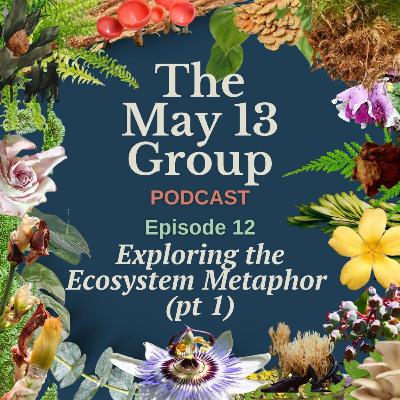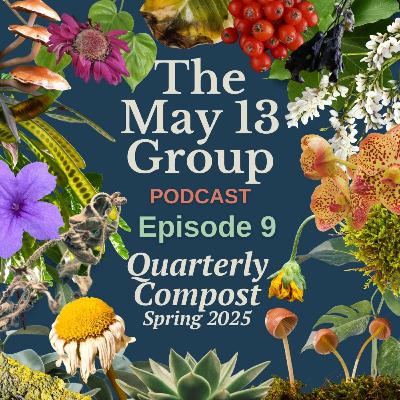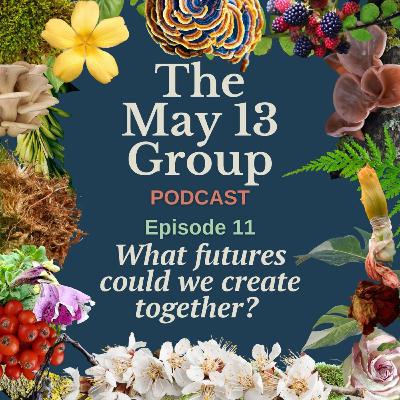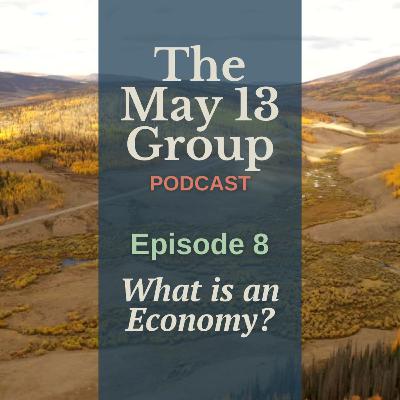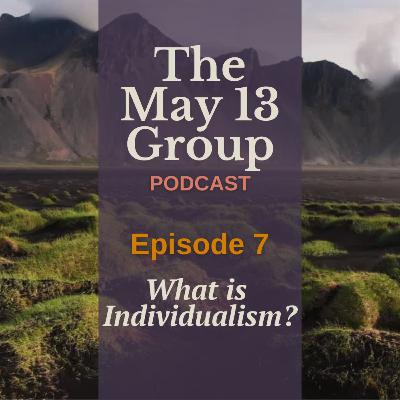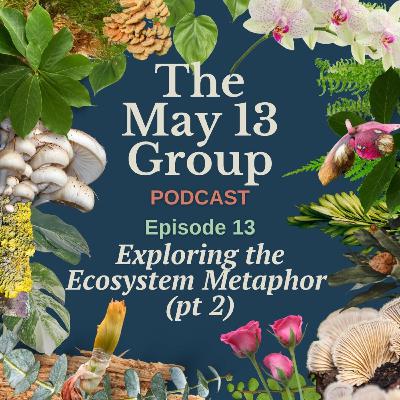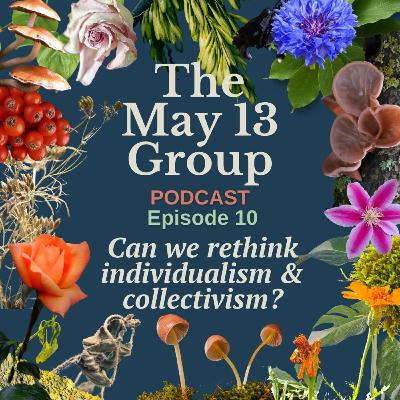Discover The May 13 Group PODCAST
The May 13 Group PODCAST

The May 13 Group PODCAST
Author: The May 13 Group
Subscribed: 0Played: 7Subscribe
Share
© The May 13 Group
Description
The May 13 Group is an emerging ecosystem oriented toward—and energized by—epistemic healing and wholeness in, through, and around evaluation. Join hosts Carolina De La Rosa Mateo and Vidhya Shanker as they dive into ideas and stories that deepen our understanding of how structurally-focused collective action, including direct action organizing, can challenge capitalist relations of knowledge production and colonial ways of knowing, reclaim the means and ends of knowledge production, and build the foundation for a solidarity economy.
16 Episodes
Reverse
In this episode, host Vidya Shanker welcomes The May 13 Group Podcast producer, Nayantara Premakumar, to explore the metaphor of ecosystems in relation to their work and personal experiences. They discuss the importance of understanding ecosystems holistically, the impact of colonialism and capitalism on land relationships, and the misappropriation of ecosystem language in various fields. The conversation also touches on personal reflections, cultural connections to land, and the need for deeper interrogation of the systems we create and participate in.Episode 2.3 TRANSCRIPT COMING SOON!Notes & References COMING SOON!Music“Inspired” Kevin MacLeod (incompetech.com) Licensed under Creative Commons: By Attribution 4.0Contact usWebsite: https://themay13group.netLinkedIn:Carolina: linkedin.com/in/carodelaVidhya: linkedin.com/in/vidhyashanker/
The May 13 Group will be closed from mid-July to mid-August. Our team will be tending to our other gardens, which means time away from email and limited engagement with social media. In the meantime, you can stay connected with us through our website. If you would like to reach us, you can do so at team@themay13group.net and we will respond when we can after we return in August.
In this episode, hosts Carolina and Vidhya reflect on our first year building a solidarity economy through this podcast. We connect recent topics—collective knowledge-making, individualism, and the idea of an economy—to each other, evaluation, accountability, and resource distribution. We note the years of work ahead, as today's socio-political situation results from decades of deliberate effort, not recent elections. Grateful for your feedback, we commit to being accessible to everyone fighting within the nonprofit industrial complex.Episode 2.1 TRANSCRIPTNotesCOMING SOON!ReferencesCOMING SOON!Music“Inspired” Kevin MacLeod (incompetech.com) Licensed under Creative Commons: By Attribution 4.0Contact us Website: https://themay13group.netLinkedIn:Carolina: https://www.linkedin.com/in/carodelaNayantara: https://www.linkedin.com/in/nayantara-premakumarVidhya: https://www.linkedin.com/in/vidhyashankerDonate to our podcast!
In this episode, Ramya Kumaran—a scholar and practitioner around imagination, play, and futures—joins host Vidhya Shanker to explore the transformative power of collective imagination for building new worlds beyond the ones we inherited. We challenge listeners to question whose imagination shapes our current realities and discuss The May 13 Group not as a single utopia but rather as a potential portal or protopia—an incremental steppingstone toward better possibilities. We invite listeners to reflect with us on healing, solidarity, and moving beyond survival to shift our perspective and open paths to meaningfully different futures.Episode 2.3 TRANSCRIPT COMING SOON!Notes & References COMING SOON!Music“Inspired” Kevin MacLeod (incompetech.com) Licensed under Creative Commons: By Attribution 4.0Contact usWebsite: https://themay13group.netLinkedIn:Carolina: https://www.linkedin.com/in/carodelaNayantara: https://www.linkedin.com/in/nayantara-premakumarVidhya: https://www.linkedin.com/in/vidhyashankerDonate to our podcast!
In this episode, Carolina and Vidhya engage in dialogue with Justin Laing of Hillombo Consulting to understand the idea of an economy, which is foundational to building a solidarity economy. We delve into the way knowledge—or perhaps narrative—is produced within racial and gendered capitalism and the role evaluation plays for the owning and ruling class. We close with an invitation to imagine what knowledge work could look like, and what individual roles we each may play, in alternative economic structures. Justin can be found at www.hillombo.net, on Instagram @hillombo, and using his name on LinkedIn.Episode 1.8 TRANSCRIPTNotes hereReferences (more here)Nego Gato; Olorisha; LukumiMni Sota MakoceOjibwe Chippewa TribeAmerican Indian MovementShawnee TribeCritical PedagogyIt's the Economy, StupidSupply & DemandCentrally Planned EconomyElinor OstromAll Economies are Ultimately Human EconomiesPolitical Economy of Economic PolicyEconomy StudiesImperialism, the Highest Stage of CapitalismEurocentricityNational StruggleFeminist Economics Critique to Neo-Classical EconomicsCollaborate to Co-LiberateGopal DayaneniThere is No AlternativeClip from “Surviving Progress”Nonprofit Industrial Complex 101Practice & Prospects of Socialism in ChinaStrategic Revolutionary Thought & Legacy of Hugo ChávezAssessing the Cuban ExperienceWhat is Racial Capitalism & Why Does It Matter?Origins of the Professional-Managerial ClassCedric Robinson, Racial Capitalism & the Return of Black RadicalismSouth African Tradition of Racial CapitalismWhat is the Working Class?CapitalismWhy Do We Say that Hegel is an “Idealist”?Idealism or MaterialismDemocracy & EvaluationJohn RawlsWhat is the Capitalist Class?Marxist Theory of the StateHow America Became CapitalistOrigin of Cost–Benefit AnalysisSocial Darwinism, Race & ResearchGramsci & HegemonyTwilight of NeoliberalismCharter Schools, Market Capitalism & Obama’s Neo-liberal AgendaHow Free Market Logic Fails in SchoolingMarket Liberalism Meets Ideological ConservatismSurplusTheory of Changee·val·u·ateWhat Base & Superstructure Mean in MarxismMarx’s Theory of Class StruggleWhat Is Liberalism?Important Insights into the Problems of National Liberation & ImperialismWorking PoorHistory of the Tax-exempt SectorOn ContradictionHistorical MaterialismDialectics, Historical Materialism & Class StruggleDomenico LosurdoMarxism vs IntersectionalityScary S WordState & RevolutionDefining SocialismWhat Do We Mean by Solidarity Economy?Socialism & the Legacy of the Soviet UnionGabriel RockhillManifesto of the Communist PartyUnderstanding Left Wing Politics & CapitalismWe Didn’t Cross the BorderCatherine Liu
Carolina and Vidhya reflect on individualism and interrogate how it shows up in our personal lives and is built into our work—including NPIC and evaluation’s training, practice, and literature as well as existing field-building and change efforts.Episode 1.7 TRANSCRIPTNotes02:17 “Utopia” asperceived or portrayed by dominating forces11:55 Concentric circles still center the individual and nuclear family, unlike the more web-like nature of many kinship structures around the world, including South Asia and West Africa.21:45 Others may counter that democratic governance structures had existed among peoples in Africa, the Americas, and Asia before the European Enlightenment. See morehere.29:22 The programs that Roosevelt and Johnson instituted were systematically eroded throughout the 1980s as “personal responsibility” replaced “rugged individualism.” See morehere.38:36 The setup is that colonial and capitalist destruction of our lands, economies, and social structures leads us to seek opportunities to fulfill our dreams—or simply survive—elsewhere. See morehere.41:37 The artist did not want to ruin her child’s innocence—it was an act of resistance and demonstration of sovereignty to have her child grow up in a way that was not defined by colonization and racism. See morehere.ResourcesThe Origins of “Pull Yourself Up By Your Bootstraps”The Dust BowlHuck's Ironic CircleIndividualism and Opposition to Redistribution in the USThere’s No Such Thing as a “Self-Made Man”BootstrappedThe Role of Complexity Studies in the Emerging “Processual” WorldviewA Processual Approach to Political ViolenceTime and ProcessHistorical Determinism RevisitedSocial, Political and Cultural Dimensions of HealthUnderstanding the Connection Between Political and Social Determinants of HealthBronfenbrenner's Ecological Systems TheorySystems Thinking and RaceKinship pathways: Nurturing and Sustaining Resilient, Responsible, and Respected Indigenous EvaluatorsThe Moral Philosophy of IndividualismIndividualism, Innovation, and Long-Run GrowthIndividualism: A Deeply American PhilosophyPolitical PhilosophyIdeologies of the IndividualDefining SocialismCommunist ManifestoThe Interstate agePlessy’s LegacyLand Acquisition and DispossessionThe Short‑Lived Promise of ‘40 Acres and a Mule’Natural RightsIndividualism vs CollectivismAge of ReasonThe Declaration of IndependenceJohn Stuart MillUnderstanding Power through Advocacy, Organizing, and ActivismLabor MovementThe 5 Basic Steps to Organizing a UnionDirect Action OrganizingThe Right to StrikeHistory of Successful BoycottsWhat Makes a Successful Protest?The Fight for RightsHerbert Hoover SpeechStock Market Crash of 1929From Rugged Individualism to Rugged CooperationRoosevelt and the New DealThe Rise of Antislavery ThoughtsYears of Adventure 1874-1914The rise and fall of Andrew MellonHow Three Families Shielded their Fortunes from Taxes for GenerationsWhy Social Security was the Cornerstone of FDR’s New DealGreat Society Programs, Definition & LBJThe Unusual Ways Western Parents Raise ChildrenNorth American Culture: Undermining BreastfeedingThis is the Closest Thing We’ve Ever Had to a Hillary Clinton Political ManifestoMargaret ThatcherHealth Promotion and the Knowledge-Attitude-Behavior ContinuumSocial ContractExploring African Relational Ethic of UbuntuMarv AlkinEvaluation RootsEvaluation Roots: An International PerspectiveManifest DestinyEvaluation Roots: A Wider Perspective of Theorists’ Views and InfluencesKinnectEmbedding the Graduate Education Diversity Internship Program Within a Larger SystemMusic“Inspired” Kevin MacLeod (incompetech.com) Licensed under Creative Commons: By Attribution 4.0Contact:https://themay13group.netCarolina:https://www.linkedin.com/in/carodelaVidhya:https://www.linkedin.com/in/vidhyashankerDonate!https://the-may-13-group.raiselysite.com
In this episode, we discuss “The Power of Perspective: Generations of Evaluators Generating Change,” an interactive journey map featured at the 2022 American Evaluation Association conference. Rooted in popular education and critical pedagogy, it highlighted the suppression of critical voices in evaluation and connected participants’ lives to a lineage of resistance within the field. We discuss its development, installation, and reception, along with future plans, including digital platforms, workshops, university curricula, and ‘zines. Efforts to enhance accessibility, including language and disability justice, are part of the ongoing collaboration’s dreams.Episode 1.6 TRANSCRIPTNotesCOMING SOON!ReferencesCOMING SOON!Music“Inspired” Kevin MacLeod (incompetech.com) Licensed under Creative Commons: By Attribution 4.0Contact us Website: https://themay13group.netLinkedIn:Carolina: https://www.linkedin.com/in/carodelaNayantara: https://www.linkedin.com/in/nayantara-premakumarVidhya: https://www.linkedin.com/in/vidhyashankerDonate to our podcast!
In this episode, thought partner and podcast producer Nayantara Premakumar joins hosts Carolina and Vidhya to reflect and update listeners on our retreat and recent milestones. We share our struggles resisting racial/gendered capitalism through cooperative, decentralized, and transparent governance and ownership structures. This includes a discussion of fiscal sponsorship and technocratic tools for decision-making. We also highlight upcoming changes to the podcast, including efforts to tie together our personal, professional, and political analyses; to acknowledge the lands we’ve inhabited; and to explicitly prompt reflection and action.Episode 1.5 TRANSCRIPTNotes01:30: It was a post on NPOCunicorns | People of Color Nonprofit Professionals, not a Facebook ad17:21: Is Fiscal Sponsorship Right for You? gets at some of our hesitation. See more on The May 13 Group PODCAST webpage.21:03: While Caro took the lead on this effort, the list referred to here was actually compiled by the New Economy Coalition’s Solidarity Economy Funding Library, which we think we became aware of through the Open Collective. Open Collective allows groups to raise and distribute money in a transparent, decentralized way. See more on the PODCAST webpage.29:12: “Society at large” is meant to suggest everyday members of society who may not directly participate in the funded and evaluated programs—for example, will they benefit from reduced crime, etc. It is meant to drive a wedge between them and the underclass who do directly participate in funded and evaluated programs. See more on the webpage.30:24: This understanding does not reflect the most recent research, such as The origins of SWOT analysis | ScienceDirect, which suggests that SWOT was developed by industries that profit by serving the U.S. military’s imperial interests and the business model of never-ending war, but it was not necessarily developed by military institutions. It was, however, uncritically adopted by nonprofit organizations despite the nature and ostensible purpose of their work being entirely different. Of course, military responses do have their place (e.g., Black Panthers, Zapatista).39:09: The expansion is not exactly exponential in that it does not reflect the change between 3 to the 4th power and 3 to the 3rd power. But the expansion is not linear because the increment of growth is not static or consistent—it continually increases.ReferencesChainLink StudiosSORA PodcastLearn about Vu Le and Community-Centric FundraisingNonprofit Industrial Complex 101: A primer on how it upholds inequity and flattens resistanceExploitation | Stanford Encyclopedia of PhilosophyMarx's Theory of Alienation | Richard Wolff on Economic Update; also see What Is Alienation? | Socialism 101The Buffer Zone with Paul Kivel; also see Social Service or Social Change? | Paul Kivel and the book review The Revolution Will Not Be Funded: Behind the Non-Profit Industrial ComplexDylan Rodríguez (He/Him)Strategy as engagement: What organization strategy can learn from military strategy | Science DirectNew Economy CoalitionA Historical Overview of Philanthropy, Voluntary Associations, and Nonprofit Organizations in the United States, 1600-2000Beware the tyranny of structurelessness; see the original article, The Tyranny of StucturelessRobert's Rules of Order; see also Roberta’s RulesBasic concepts and principles | Sociocracy for AllLean CoffeeThe Fibonacci Sequence: Nature's Code; see also Golden Ratio for Art BeginnersPythagorean TheoremThe May 13 Group PODCAST Episode 1: Who are we?Active, acute, overt physical genocide as distinct from—but related to—seemingly passive, chronic, and covert structural genocideMusic“Inspired” Kevin MacLeod (incompetech.com) Licensed under Creative Commons: By Attribution 4.0Contact us Website: https://themay13group.netLinkedInCarolina: https://www.linkedin.com/in/carodelaVidhya: https://www.linkedin.com/in/vidhyashanker
We're going to be taking a break this month, but we'll be back in October. In the meantime, you can stay connected with us on our website themay13group.net.
In this episode, Sarah Stachowiak joins Carolina and Vidhya in reflecting transparently on our financial relationship. How does the owning class’s control over manufacturing processes and products show up in the knowledge economy and the evaluation of public and nonprofit/ nongovernmental programs? What does it mean for the “raw material” (data about/ from program participants)? For the “independence” of knowledge workers, who market ourselves in terms of how much more value we produce for the people who pay for our goods and services? Can we think of financial exchange differently? How could we organize accountability in knowledge work horizontally across class status—not necessarily around shared experiences of oppression, but rather around shared resistance against it?Episode 1.4 TRANSCRIPTNotes1:30: In solidarity with the Duwamish, we lift up this petition for federal recognition as well as their reparations program, Real Rent6:47: The Critical Educators for Social Justice Special Interest Group (SIG) made is no longer available online. Read more here.8:47: AEA’s statement is no longer available online but reprinted here10:12: It was more like 6 weeks later, not 6 months later that the Advocacy & Policy Change TIG issued a statement11:35: The only other statement that we are aware of AEA having made was issued in 2003. Read more here.33:11: Read more about “kinder and gentler” here and here35:29: The financial benefits are explained hereReferencesORS ImpactWho Are We?What is anthropology?Making Ends MeetKathryn EdinLaura LeinPersonal Responsibility and Work Opportunity Reconciliation ActThe welfare queen myth shapes who we believe is deserving and fully human, and who is notEvalTalkAEA APC TIGGeorge ZimmermanAmerican Educational Research Association (AERA)Critical Educators for Social Justice“Special Interest Group” (SIG)At‐risk programs: Evaluation and critical inquiryWhite nationalism appears to be connected ideologically to the growing Christian nationalism movementAmerican Evaluation AssociationRemembering the El Paso massacre that targeted LatinosMultiethnic Issues in Evaluation (MIE) Topical Interest Group (TIG)APC Evaluators Actions to Undo Racism and White Supremacy in our FieldJared RaynorRobin KaneZsuzsanna LippaiAnne GiennapPledge of Refusal to ProfitCausal PathwaysOn Capitalism’s Emotional LogicsWhite Women’s Power in NonprofitsToward an Understanding of Founder’s SyndromeYvonne BelangerSolidarity Is Not a Market ExchangeThe Price of Civil Rights: Black Lives, White Funding, and Movement CapturePhilanthropy & Movement CaptureWhat is General Operating Support and Why is it Important?Hindolo PokawaWhat Is A Co-op?Marxism and Worker CooperativesContradictions of Capitalism and Their Ideological CounterpartsThe New Politics of OwnershipIdentity Politics and Elite CaptureThe Curious Case of Self-ExploitationThe fantasy of employability and the ironic struggle for self-exploitationSocial StratificationYes, I Said "National Liberation"Purity politics in compromised timesFrom allies to comradesWhy join the Intro to Decolonial Sustainability course from Possible FuturesColonialism, Coloniality and Settler ColonialismDecolonization of Asia and Africa, 1945–1960Liberalism and the Idea of TolerationNeoliberalismGramsci and hegemonyPossible FuturesHow corporate “sustainability” evolves into hyper-colonial “regeneration”Reparations as a Transitional Justice MechanismFrom Allies to Co-ConspiratorsThe Corporate War Against Higher EducationThe Emotional Logic of CapitalismA Theory of CommodificationMusic“Inspired” Kevin MacLeod (incompetech.com) Licensed under Creative Commons: By Attribution 4.0Contact us Website: https://themay13group.netLinkedIn:Carolina: https://www.linkedin.com/in/carodelaVidhya: https://www.linkedin.com/in/vidhyashankerDonate to our podcast!
In this episode, Carolina and Vidhya reflect on the tension among learning from the past, meeting immediate needs in the present, and both imagining and building a better future. We discuss evaluation’s origins as a tool for capital and grapple with our status as members of the professional/ managerial class. Folx with our training and current positionality find uncertainty “risky.” Whose interests do we ultimately serve? Could a solidarity economy offer evaluators a safety net or better fallback position from which to make collective demands—by organizing ourselves or joining existing movements that serve the working class?Episode 1.3 TRANSCRIPTNotes8:19, 19:50, 20:36: The author and date of publication are Edward Suchman and 1967.21:12: Vidhya meant The Personal Responsibility and Work Opportunity Reconciliation Act of 199624:44: It is racist in that there are no regular Black or indigenous characters. Additionally, although there IS an Asian adoptee and a Colombian immigrant character, the Asian adoptee is not old enough to speak for much of the show’s run. Jokes are made at Asians’ expense, including hers. Plots about the Colombian immigrant largely reinforce stereotypes about Latine women.ReferencesAppreciative InquiryNonprofit Industrial Complex: a set of symbiotic relationships that link political and financial technologies of state and owning class control with surveillance over public political ideology, including and especially emergent progressive and leftist social movements (Rodriguez, 2006)Debating Colonial Legacies of Development Studies“Why is Evaluation So White?”Professional Evolution of Michael ScrivenRecapturing Moral Discourse in EvaluationCapitalism & the Logic of Deservingness: Understanding Meritocracy through Political EconomyJust TransitionBlack PowerEthnic Studies Student StrikeStudent Socialist Movement in FranceEvaluation Roots Reconsidered: Asa Hilliard, a Fallen Hero in the “Nobody Knows My Name” Project & African Educational ExcellenceUnearthing Evaluation’s RootsEvaluation and Social Justice—Seeking multicultural validity: A postcard from the roadPositivismScientific management brought the scientific method into managerial practice to address the loss that capital incurs through “inefficiency” in labor productivityWhat “Capitalism” Is and How It Affects PeopleRacist Beginnings of Standardized TestingSocial Darwinism, Race & ResearchReclaiming Abundance Under CapitalismBetter Living Through Evaluation? Images of Progress Shaping Evaluation PracticeFrom Colonial Administration to Development Studies: A Postcolonial Critique of the History of Development StudiesDiversity in the Nonprofit & Voluntary SectorEvaluative Research DesignJustin Laing of Hillombo ConsultingWhat Is Orientalism?Perry Preschool ProjectThe Negro Family: The Case for National ActionWar on PovertyTemporary Assistance for Needy FamiliesAffirmative ActionThis was the closest to a critical review of Modern FamilyEpistemic ViolenceCharles MillsRighting WrongsMission Statements as Strategic Management ToolsWhat is Scientism?Eugenics & Scientific RacismBase & SuperstructureCIA & the Frankfurt School’s Anti-CommunismRuling Class & the Buffer ZoneOn the Origins of the Professional-Managerial ClassWhat Do We Mean By Solidarity Economy?Measuring Regenerative EconomicsWhat is the Extractive Economy?National Labor Relations ActNeoliberal GlobalizationProject 2025Study Finds Untapped Potential in Native American ArtMusic“Inspired” Kevin MacLeod (incompetech.com) Licensed under Creative Commons: By Attribution 4.0Contact usWebsite: https://themay13group.netLinkedIn:Carolina: https://www.linkedin.com/in/carodelaVidhya: https://www.linkedin.com/in/vidhyashankerDonate to our podcast!
In this episode, hosts Carolina De La Rosa Mateo and Vidhya Shanker ask, “why evaluation?” We wonder if evaluation can be a site of resistance against racial/gendered capitalism, when capital developed evaluation to support its interests and continues to control the means and ends of knowledge production. Can evaluators renounce capitalism and positivism to organize against exploitation alongside the working class? Can we refuse to take EEI, DEI, CRE, GEDI, CRT, etc. for granted and change the structure of the knowledge economy?Episode 1.2 TRANSCRIPTNotes7:19: Vidhya should have referred to the imperial wars in Southeast Asia.19:45: Access to the written word provides an advantage only in hierarchical systems that devalue oral traditions and non-written languages and knowledge to justify the displacement of entire bodies of knowledge and ways of knowing and the corresponding domination of entire peoples who are portrayed as primitive or unfit to govern themselves20:30: (Vidhya’s elaboration) Tamil language and culture predate Sanskrit and what people now call Hinduism. But the language that brahmins typically claim is Sanskrit. Though no longer spoken, Sanskrit is still used within Hindu hegemony in much the same way that Latin and Greek are used within European hegemony: to provide authority and legitimacy to specific ideas and practices and to discredit others.23:15: The only time that there is not an adversarial relationship between workers and management is when workers are management, as in self-governed cooperatives47:06: We just resist being reduced to numbers. There is also the stereotype that Asians only like numbers—from the 1965 Immigration ActReferencesRodríguez, D. (2016). The Political Logic of the Non-Profit Industrial Complex. Scholar and Feminist Online—Navigating Neoliberalism in the Academy, Nonprofits, and Beyond, 13.2.Seizing the Means of Knowledge Production (6,000-word blog)How Environmentalism was Separated from Class Politics (60-min video of a Jacobin talk by Matt Huber)Professional-Managerial Class (2-hr video of a Jacobin talk with Catherine Liu)Dialectic of Enlightenment (25-min video)How Europe Under-developed Africa: 50 Years Since its Publication (2-hr video about Walter Rodney’s activist scholarship)Vidhya’s understanding is based on personal communication over time with Justin Laing of Hillombo ConsultingWhy Marx was Right: Alienation (25-min video)How Capitalism Absorbs Anticapitalism (15-min video)West India Emancipation speech delivered at Canandaigua, New York, August 3, 1857“Nobody in the world, nobody in history, has ever gotten their freedom by appealing to the moral sense of the people who were oppressing them” (p. 139 of Assata: An autobiography, 1987; Lawrence Hill)Marshall, A. G. (2015). Black Liberation and the Foundations of Social Control. The American Journal of Economics and Sociology, 74(4), 775–795.Delgado, R. (2009.) Explaining the Rise and Fall of African-American Fortunes: Interest Convergence and Civil Rights Gains. Harvard Civil Rights—Civil Liberties Law Review, 37: 369–387.Kohl-Arenas, E. (2015). The Self-Help Myth: Towards a Theory of Philanthropy as Consensus Broker. The American Journal of Economics and Sociology, 74(4), 796–825.MN IBPOC in Evaluation Community of Praxis Facebook groupFrankfurt School, Student Radicalism & Anti-Communism (75-min podcast by Unequal Exchange with Gabriel Rockhill)Frankfurt School: From a Failed Revolution to Critical Theory (25-min video)A place for solitude, community & healing for attendees who identify as Indigenous, Black, and People of Color (IBPOC) at Evaluation 2019! (AEA365 Blog)Music“Inspired” Kevin MacLeod (incompetech.com) Licensed under Creative Commons: By Attribution 4.0Contact usWebsite: https://themay13group.netLinkedIn:Carolina: https://www.linkedin.com/in/carodelaVidhya: https://www.linkedin.com/in/vidhyashankerDonate to our podcast!
In this episode, we (hosts Vidhya Shanker and Carolina De La Rosa Mateo) introduce ourselves, share how our worlds came together, and discuss The May 13 Group. We talk about our personal histories inside and outside evaluation, the Minnesota IBPOC in Evaluation Community of Praxis, how The May 13 Group came to be, and what it could possibly become. We invite anyone who works in and around evaluation or other knowledge work (e.g., philanthropy, nonprofits, NGOs, government, academia) to take a listen and help craft the ecosystem!Episode 1.1 TRANSCRIPTNotes1 correction: At the 45:34 mark, Vidhya misspoke by saying "before my generation and even before me" when she meant to say "before me and even before my generation."ReferencesWhy is Evaluation So White? (90-min video of Center for Evaluation Innovation webinar that took place on 5/13/2020)Definitional Tension: The Construction of Race in and through Evaluation (dissertation that draws from and led to many of the ideas The May 13 Group is working with)Pangea World Theater (comrades who helped create the stop-action play entitled The Revolution Will Not Be Culturally Competent, which led to the MN IBPOC in Evaluation Community of Praxis)Theater of the Oppressed (playlist of videos ranging from 5 to 30 min on Augusto Boal and the performance traditions underlying The Revolution Will Not Be Culturally Competent)Welcome to the Revolution! MN IBPOC in Evaluation Community of Praxis (AEA365 Blog entry)Shaking Up the Evaluation Patriarchy: AEA Womanists & Feminists Coming Together to Claim Power and Place in the Academy (AEA365 Blog entry)The Invisible Labor of Women of Color and Indigenous Women in Evaluation, Part 1 (AEA365 Blog entry)The Invisible Labor of Women of Color and Indigenous Women in Evaluation, Part 2 (AEA365 Blog entry)Bay Area Transformative Justice Collective (inspiration for much of the mutual aid work)Why is Evaluation So White? 10 Ways to Repair, Reverse, Redress, and Regenerate from the Racialized Circulation of Capital in Evaluation (20-min video of Grantmakers for Effective Organizations short-talk)Mondragon (worker-owned coop in Spain)The Rand Corporation and Our Policy Makers (article about the Rand Corporation)Beyond Mobility: The Limits of Liberal Urban Policy (paper with a bit about/ surrounding the Urban Institute)The Revolution Will Not Be Funded: Beyond the Non-Profit Industrial Complex (book about the origins of philanthropy and NPIC)Music“Inspired” Kevin MacLeod (incompetech.com) Licensed under Creative Commons: By Attribution 4.0Contact usWebsite: https://themay13group.netLinktree (Vidhya): https://linktr.ee/dr.vidhyashankerphdLinkedIn:Carolina: https://www.linkedin.com/in/carodelaVidhya: https://www.linkedin.com/in/vidhyashankerDonate to our podcast!
In this conversation, Carolina and The May 13 Group’s producer delve into the ecosystem metaphor again, discussing its implications in the nonprofit sector, the importance of holistic understanding, and the interconnectedness of various players within the ecosystem. They explore the nonprofit industrial complex as an ecosystem, the role of intention, and the potential for destruction and nourishment within these systems. The discussion also touches on the evaluation theory tree as a metaphor and questions the value of the ecosystem metaphor itself.Episode 13 transcriptNotesCOMING SOON!ReferencesCOMING SOON!Music“Inspired” Kevin MacLeod (incompetech.com) Licensed under Creative Commons: By Attribution 4.0Contact us Website: https://themay13group.netEmail: team@themay13group.net LinkedIn:Carolina: https://www.linkedin.com/in/carodelaVidhya: https://www.linkedin.com/in/vidhyashankerDonate!Raisely
In this episode, hosts Carolina and Vidhya dive deep into collectivism in relation to the (neo)liberal ideology of individualism that underpins the nonprofit/nongovernmental industrial complex and evaluation. We invite Naaima Khan, a strategist and evaluator, to discuss the implications of collectivism in the context of structurally-focused analysis and action. The conversation weaves personal reflections, historical definitions, and critiques of language to explore themes of leadership, accountability, and culture. We discuss the need to shift how success is defined, acknowledging the discomfort that often accompanies true collectivism.Episode 2.2 TRANSCRIPTNotes & References COMING SOON!Music“Inspired” Kevin MacLeod (incompetech.com) Licensed under Creative Commons: By Attribution 4.0Contact usWebsite: https://themay13group.netLinkedIn:Carolina: https://www.linkedin.com/in/carodelaNayantara: https://www.linkedin.com/in/nayantara-premakumarVidhya: https://www.linkedin.com/in/vidhyashankerDonate to our podcast!
The May 13 Group is an emerging ecosystem oriented toward—and energized by—epistemic healing and wholeness in, through, and around evaluation. Join hosts Carolina De La Rosa Mateo and Vidhya Shanker as they dive into ideas and stories that deepen our understanding of how structurally-focused collective action, including direct action organizing, can challenge capitalist relations of knowledge production and colonial ways of knowing, reclaim the means and ends of knowledge production, and build the foundation for a solidarity economy.


